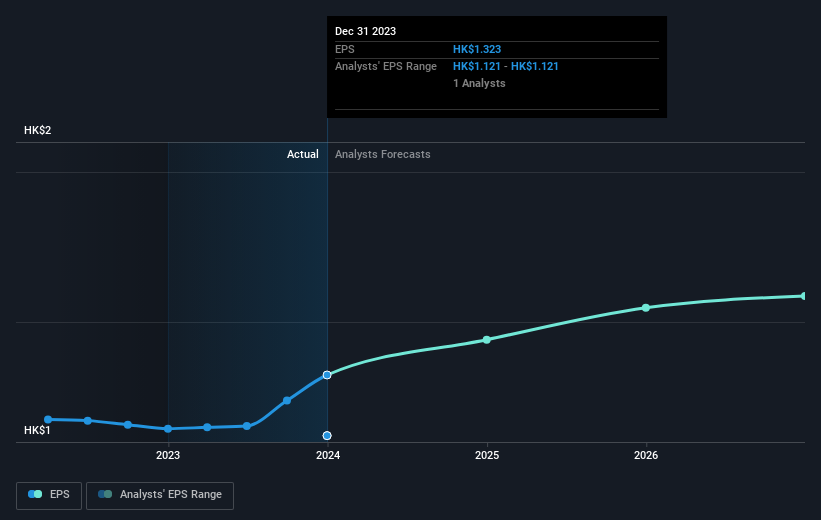Dah Sing Banking Group's (HKG:2356) earnings have declined over five years, contributing to shareholders 36% loss

Dah Sing Banking Group Limited (HKG:2356) shareholders should be happy to see the share price up 27% in the last quarter. But if you look at the last five years the returns have not been good. You would have done a lot better buying an index fund, since the stock has dropped 53% in that half decade.
While the last five years has been tough for Dah Sing Banking Group shareholders, this past week has shown signs of promise. So let's look at the longer term fundamentals and see if they've been the driver of the negative returns.
View our latest analysis for Dah Sing Banking Group
To quote Buffett, 'Ships will sail around the world but the Flat Earth Society will flourish. There will continue to be wide discrepancies between price and value in the marketplace...' One imperfect but simple way to consider how the market perception of a company has shifted is to compare the change in the earnings per share (EPS) with the share price movement.
During the five years over which the share price declined, Dah Sing Banking Group's earnings per share (EPS) dropped by 5.6% each year. This reduction in EPS is less than the 14% annual reduction in the share price. This implies that the market is more cautious about the business these days. The low P/E ratio of 4.96 further reflects this reticence.
You can see how EPS has changed over time in the image below (click on the chart to see the exact values).

We know that Dah Sing Banking Group has improved its bottom line lately, but is it going to grow revenue? Check if analysts think Dah Sing Banking Group will grow revenue in the future.
What About Dividends?
It is important to consider the total shareholder return, as well as the share price return, for any given stock. The TSR is a return calculation that accounts for the value of cash dividends (assuming that any dividend received was reinvested) and the calculated value of any discounted capital raisings and spin-offs. Arguably, the TSR gives a more comprehensive picture of the return generated by a stock. In the case of Dah Sing Banking Group, it has a TSR of -36% for the last 5 years. That exceeds its share price return that we previously mentioned. And there's no prize for guessing that the dividend payments largely explain the divergence!
A Different Perspective
We're pleased to report that Dah Sing Banking Group shareholders have received a total shareholder return of 29% over one year. That's including the dividend. Notably the five-year annualised TSR loss of 6% per year compares very unfavourably with the recent share price performance. This makes us a little wary, but the business might have turned around its fortunes. While it is well worth considering the different impacts that market conditions can have on the share price, there are other factors that are even more important. Even so, be aware that Dah Sing Banking Group is showing 1 warning sign in our investment analysis , you should know about...
We will like Dah Sing Banking Group better if we see some big insider buys. While we wait, check out this free list of undervalued stocks (mostly small caps) with considerable, recent, insider buying.
Please note, the market returns quoted in this article reflect the market weighted average returns of stocks that currently trade on Hong Kong exchanges.
New: Manage All Your Stock Portfolios in One Place
We've created the ultimate portfolio companion for stock investors, and it's free.
• Connect an unlimited number of Portfolios and see your total in one currency
• Be alerted to new Warning Signs or Risks via email or mobile
• Track the Fair Value of your stocks
Have feedback on this article? Concerned about the content? Get in touch with us directly. Alternatively, email editorial-team (at) simplywallst.com.
This article by Simply Wall St is general in nature. We provide commentary based on historical data and analyst forecasts only using an unbiased methodology and our articles are not intended to be financial advice. It does not constitute a recommendation to buy or sell any stock, and does not take account of your objectives, or your financial situation. We aim to bring you long-term focused analysis driven by fundamental data. Note that our analysis may not factor in the latest price-sensitive company announcements or qualitative material. Simply Wall St has no position in any stocks mentioned.
Have feedback on this article? Concerned about the content? Get in touch with us directly. Alternatively, email editorial-team@simplywallst.com
About SEHK:2356
Dah Sing Banking Group
An investment holding company, provides banking, financial, and other related services in Hong Kong, Macau, and the People’s Republic of China.
Excellent balance sheet established dividend payer.


